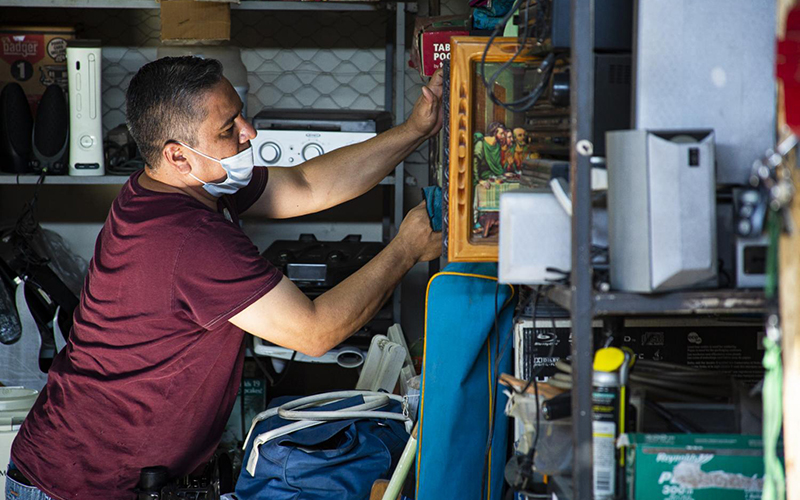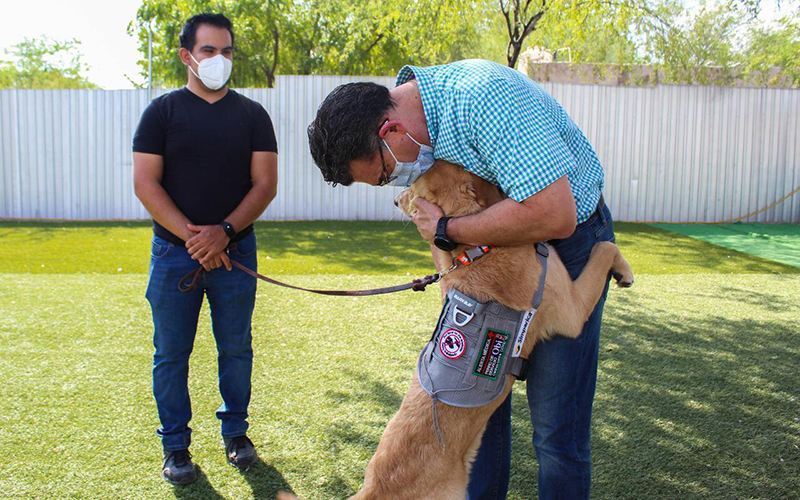
Enrique Clausen, Sonora’s health secretary, hugs Leia as Juan Mancilla holds her leash. (Photo by Juan Mancilla)
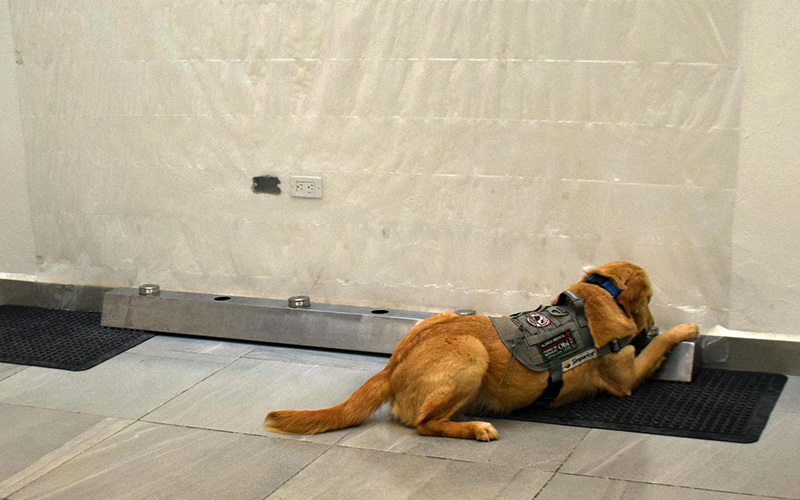
Detector dog Leia lies down beside a canister containing sweat from someone who tested positive for COVID-19. (Photo by Kendal Blust/KJZZ)
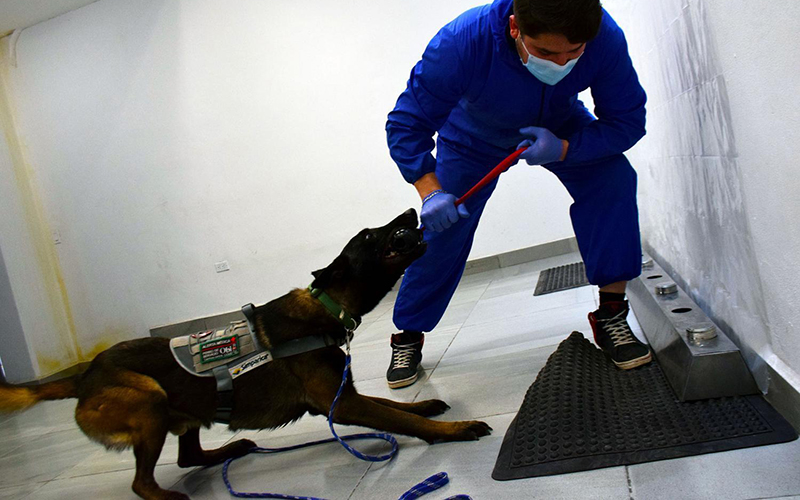
Dog handler José Corral plays with Harry, a Belgian Malinois, after his nose correctly identifies a sample of COVID-19. (Photo by Kendal Blust/KJZZ)
HERMOSILLO, Mexico – Four small, stainless steel canisters with perforated lids are lined along one wall in a chilly room on the second floor of the largest COVID-19 testing site in Sonora state.
A few feet away, a golden retriever named Leia looks up expectantly at her handler, who’s decked head-to-toe in a blue protective suit, mask and gloves.
“Search!” he shouts in Spanish.
Leia leaps up to sniff the metal containers, each filled with gauze scented with the sweat of a person who has been tested for COVID-19. Three are negative, one is positive.
Within seconds, Leia finds the one she’s looking for, puts her paw over it and lies down.
“That’s it!” her handler congratulates her, rewarding her with praise and a toy for correctly spotting the COVID-19 positive sample, as the canisters are swapped out with a new set.
Leia is one of nine dogs in Sonora who have been trained to detect COVID-19 — the first such sniffer dogs in Mexico. For now, they’re working at Sonora’s mass testing centers, screening asymptomatic patients.
“There aren’t enough resources to give everyone PCR tests. It’s the same problem all over Mexico,” said Juan Mancilla, Leia’s owner and the director of OBI: Caninos Contra el Covid, a private initiative that partnered with the state health department in August to train the detector dogs. “So we’re using the dogs.”
In Sonora, PCR (polymerase chain reaction) tests are available only to people who have active COVID-19 symptoms. And although dogs aren’t a substitute, Mancilla said, they are a cheap, fast and effective screening tool to help identify who might need further testing.
Some can correctly detect 90% of positive cases, he said, and are good at early detection.
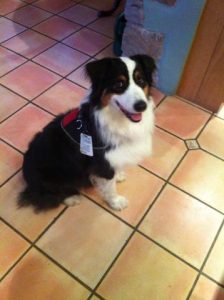
Sonora’s COVID-19 detector dog training program is named after Juan Mancilla’s service dog, Obi, who could recognize when his owner was about to have an epileptic seizure. Obi died in January 2020. (Photo courtesy of Juan Mancilla)
“The use of dogs for the detection of illnesses is something that’s been studied for years, for decades,” Mancilla said. “The only difference here is that we’re using it for COVID-19 now.”
In fact, the idea for this project stemmed from Mancilla’s own long-time service dog, Obi, who could recognize when Mancilla was about to have epileptic seizures.
“He was with me for 11 years,” he said. “And the project is named after him.”
After Obi died in January 2020, Mancilla adopted Leia and started training her to be a seizure alert dog. One day, her trainer mentioned new studies showing that dogs might be able to detect COVID-19, so they gave it a try.
Within days, Mancilla said, he had secured financial support from Sonora health officials, and the assistance of local and international researchers who helped design the training program.
So far, they’ve had good results, he said. The problem now is convincing people it really works.
“There are a lot of people who don’t believe it,” Mancilla said. “And it’s not easy to convince them. I think you’ll just change their minds with time. And with results.”
Sniffer studies
“I think there’s a rough dichotomy of people that have dogs and get it, and those that don’t,” said Steve Lindsay, a professor of Infectious Diseases at Durham University in northern England who started working with sniffer dogs several years ago to detect malaria parasites.
Dogs’ noses have been trained to identify drugs, firearms and explosives, and such medical conditions as cancer, diabetes and Parkinson’s disease.
“You name it and they can do it,” Lindsay said. “They have an extraordinary sense of smell. I think it’s amazing. Extraordinary animals we live with.”
When the pandemic started in March 2020, researchers around the world, including Lindsay’s team on the malaria study, started looking into whether dogs could smell COVID-19.
Although research is ongoing, sniffer dogs have been deployed at airports in Helsinki, Dubai and Santiago, Chile, and the Miami Heat has used them to screen fans at home games.
“All I can say at this time is that we are encouraged and pretty convinced from our research and elsewhere that there is a distinct COVID smell,” Lindsay said.
Of course, scientists are cautious and continuing to study their findings to make sure they’re right, he said. Plus, dogs require rigorous training to do the job.
“So if I have a query,” Lindsay said, “it would be that one needs a lot of skill and experience to do this.”
Here to stay
At the OBI training center in Sonora, dogs bark as a handler brings Krillin, a new trainee, out of his kennel to practice sniffing.
“At the beginning of a project, you go through trial and error sometimes,” said trainer Adrian Orduño, who has been working with detector dogs in Mexico for decades.
He said teaching dogs to identify COVID-19 has been challenging because you have to make sure they aren’t picking up on other smells in the samples of sweat or saliva rather than the disease itself. It took about four months to be sure the first group had picked up on the right scent.
“But training a dog’s nose, it’s the base of all the work I do,” he said.
Whether for drugs or disease, it’s largely the same process to prepare a dog for detection, Orduño said. And he thinks the next generation of COVID-19 dogs will be ready more quickly.
Three of the dogs OBI has trained belong to the state, but the others might soon start working at airports, hospitals, factories, baseball stadiums — anywhere crowds gather and the coronavirus that causes COVID-19 can easily spread, Mancilla said, calling them a tool for start Sonora on the path to economic reactivation after the pandemic.
And as vaccines begin to slowly roll out in Sonora, he’s not worried about decreasing demand for COVID-19 sniffer dogs.
“The truth is, I think COVID is here to stay,” he said. “Vaccinations will take time, and not everyone can or will get one. There will always be a demand for detector dogs.”
And his dogs’ noses will be ready to sniff out cases wherever they’re needed.
The Fronteras Desk is a unique KJZZ project that covers a wide expanse of an under-covered news desert that stretches from northern Arizona deep into northwestern Mexico.
